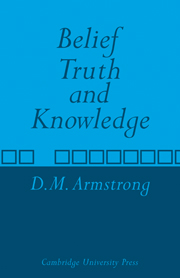Book contents
- Frontmatter
- Contents
- Part I Belief
- Part II Truth
- Part III Knowledge
- 10 Knowledge Entails True Belief
- 11 The Infinite Regress of Reasons
- 12 Non-Inferential Knowledge (1)
- 13 Non-Inferential Knowledge (2)
- 14 Inferential and General Knowledge
- 15 Further Considerations about Knowledge
- Conclusion
- Works referred to
- Index
13 - Non-Inferential Knowledge (2)
from Part III - Knowledge
Published online by Cambridge University Press: 23 October 2009
- Frontmatter
- Contents
- Part I Belief
- Part II Truth
- Part III Knowledge
- 10 Knowledge Entails True Belief
- 11 The Infinite Regress of Reasons
- 12 Non-Inferential Knowledge (1)
- 13 Non-Inferential Knowledge (2)
- 14 Inferential and General Knowledge
- 15 Further Considerations about Knowledge
- Conclusion
- Works referred to
- Index
Summary
In support of our account of non-inferential knowledge
In the previous chapter an analysis of non-inferential knowledge was developed in terms of a law-like relation between beliefs and the thing believed. In response to various objections the analysis was complicated and modified. But no systematic defence of an analysis in terms of a law-like relation between beliefs and the world has yet been offered. This will be the business of this section.
The argument has two steps. First, it will be argued that a law-like connection between belief and thing believed is at least a necessary condition for non-inferential knowledge. Second, once this is granted, it will be argued that it is hard to find any further necessary condition, so that the condition is in fact necessary and sufficient.
The first step, that such a law-like connection is at least necessary, may be defended as usual by the ‘method of subtraction’. Consider the case where the law-like connection fails to obtain. Suppose that A believes that c is J non-inferentially, and his belief is true. But suppose it is not the case that there exists any H, for which Ha is true, such that if anybody has property H then, if he further believes that c is J, it is indeed the case that c is J. (Or, if there is such an H, it is a property which is so specific that it excludes the real possibility of repetitions of situations of the sort H.
Information
- Type
- Chapter
- Information
- Belief, Truth and Knowledge , pp. 184 - 197Publisher: Cambridge University PressPrint publication year: 1973
